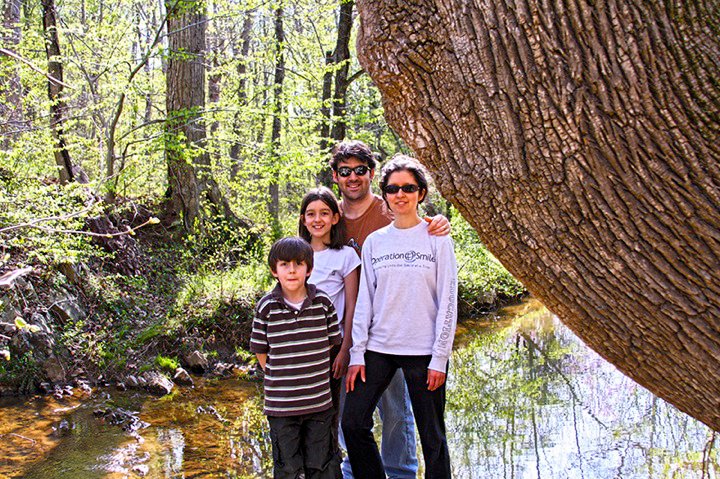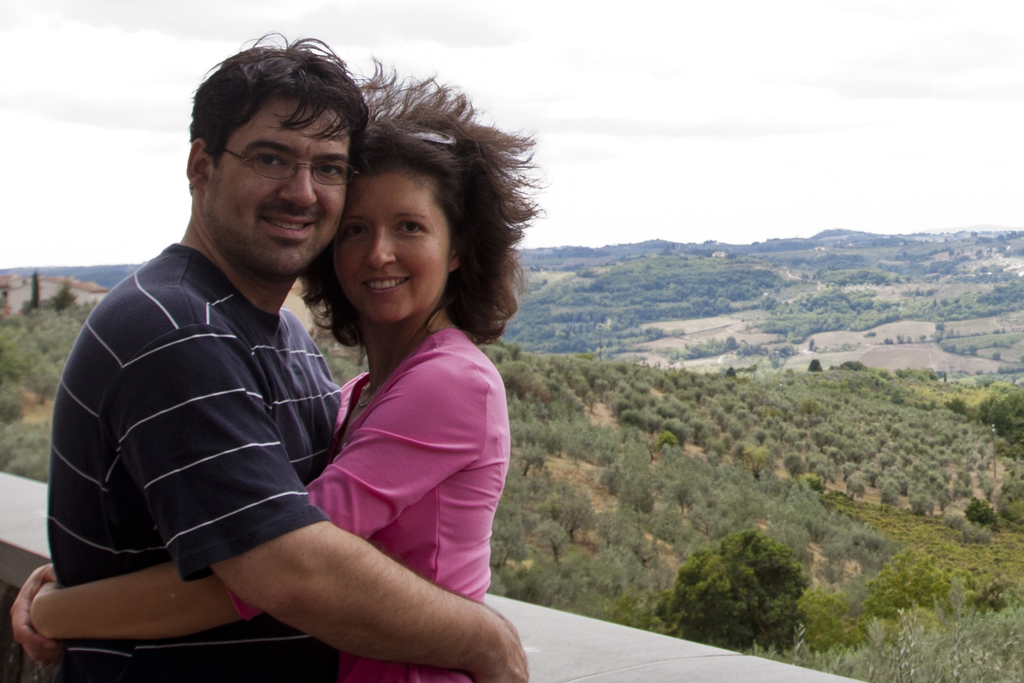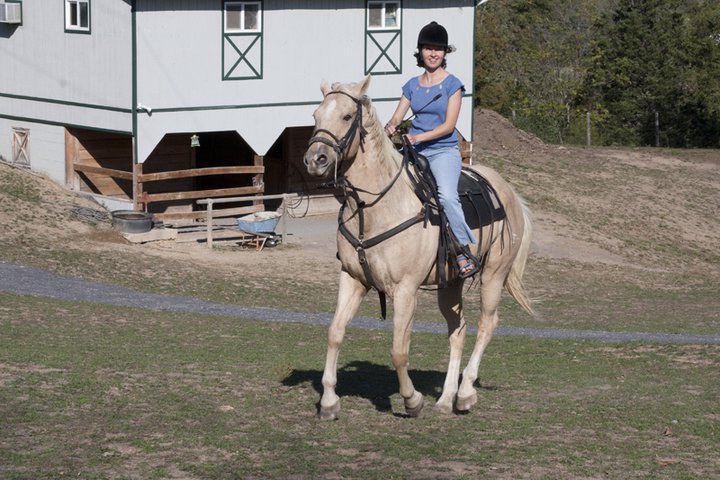I work with them every day; so I know how awesome Precision Nutrition’s coaches really are.
Today you get to meet one of them, Veronica Porterfield. This way you can find out too.
+++
There’s a scarlet heart embroidered on Veronica Porterfield’s white polo shirt. “The shirt was a Mother’s Day present from my family,” she says. “My husband was worried it was too big. But I decided to wear it anyway.”
Inside the heart are the numbers 31/28; they stand for some lines from Proverbs about a virtuous woman: Her children arise and call her blessed; her husband also, and he praises her.
Spend an hour talking with Veronica, and you’ll understand why they chose it.
In the first place, there’s the miracle of her beginnings.
Born in Bogota, Colombia, Veronica suffered from birth trauma. Altogether, she lost 16 minutes of oxygen, and although she lived, for the first year of her life, she didn’t develop typically. “I didn’t crawl. Didn’t talk or vocalize. Essentially, I did nothing. I seemed like a lost cause.”
Naturally, her family worried. And when her American-born Colombian father, a radiologist, learned that if he did not return to the U.S. he would lose his citizenship, her parents were faced with a difficult choice. Should they leave all they’d worked for in Colombia and start fresh in the States, or should they stay?
Veronica’s needs tipped the balance; they thought they might find better long-term care for her in the U.S.
Because the way things were going, it looked as if she’d require that.
On the eve of their departure for America, the extended family held a goodbye party. They shared food, conversation, laughter, maybe a few tears.
And at one point in the evening, possibly thinking about the cooler weather in the United States, Veronica’s grandfather took a coat and placed it gently on her shoulders.
It may have looked like a blanket of tweed, but really, it was the mantle of health, of love, of faith.
Because the minute she felt its weight, Veronica stood up. And walked.
“It must have been divine choreography,” she says now.
Up until then, she’d hadn’t even crawled. But from that point on, her development was completely normal.
“It had something to do with his belief in me,” she muses. “Unlike some of the people in my life, my grandfather saw me as whole. Unbroken. And on some level, I must have felt that.”
As a result, she knows, deep in her bones, the importance of expectations.
“What others believe of us, and what we believe of ourselves, can powerfully influence what we become and how we see ourselves. I know it because I’ve lived it.”
Bone-deep knowing like that is priceless in a coach.
However, nutrition coaching might seem an odd choice for Veronica, a multi-lingual graduate of Georgetown University’s prestigious School of Foreign Service.
In fact, when Veronica enrolled there, she thought she was headed for a career in law.
Partway through her law degree, something unexpected happened.
She fell in love, got married, and gave birth to her first child. And suddenly, her career focus also changed.
“My daughter had some minor health problems. Nothing terrible — but she had ongoing eczema and GI trouble, and I wasn’t satisfied with my physician’s advice to give her drugs.
I ended up seeing a nutritionist who suggested that it might be a wheat allergy. We took her off wheat – me, too, because I was breast-feeding at the time – and almost immediately, the problems cleared up.”
“That was the first time I really recognized that something as basic as nutrition could make a profound difference in someone’s health. It really got me thinking,” she says. And it awakened a profound curiosity about the role of diet in people’s lives.
Still, it wasn’t until after the birth of her second child that Veronica started making the connection between nutrition and her own health.
“My hair was falling out. And I was always cold.”
Her doctor figured this was just a result of post-pregnancy hormonal changes.
“But I wondered if it might be my thyroid.”
Her doctor ran some tests. Sure enough, they showed low T4 and elevated TSH; in addition, her antithyroglobulin antibodies were extremely high. She had Hashimoto’s disease.
In Hashimoto’s, also known as chronic lymphocytic thyroiditis, the immune system attacks the thyroid gland. The resulting inflammation often leads to an underactive thyroid gland (hypothyroidism). Hashimoto’s is, in fact, the most common cause of hypothyroidism in North America.
“The doctor wanted to put me on medication,” Veronica says. “But my mom had been on meds for her thyroid for years. And even though her lab values were normal now that she was on medication, she was still experiencing all the other symptoms of thyroid disease. I didn’t want that. I wanted to get to the bottom of what was causing the problem.”
And – thinking back to her experience with her daughter — she wondered about the connection to gluten. Research in the last decade has demonstrated that significant proportions of people with thyroid disease have underlying celiac disease or gluten intolerance.
Taking gluten out of her daughter’s diet had helped her daughter. Maybe eliminating gluten from her own diet would be just as beneficial.
Veronica’s doctor doubted it.
But the lab tests – and Veronica’s state of health – proved otherwise. Two months after removing gluten, her lab readings had dramatically improved. And these improvements were a direct result of removing gluten – because nothing else had changed.
 Coach Veronica and her family.
Coach Veronica and her family.
In a sense, Veronica was her own first client.
Because by this time, she’d become so fascinated with nutrition that she’d decided to go back to school to get a Master’s degree in the subject. And she’s been teaching and consulting about nutrition ever since.
Veronica understands — literally, on a gut level — the difference between eating a diet that supports and nurtures your body and one that harms it.
She’s been through it.
She knows what it’s like to feel lousy, without knowing the reason.
She knows how empowering it can be to find the cause and make the right change.
And she knows first-hand about the social pressures people face when they choose to eat differently than others in their circle.
“When you start to eat to support your health, people in your life can feel judged,” she explains. “They think you’re saying they’re wrong, or trying to change them.”
She knows, first-hand, how to address that. “It really helps to explain that it’s about your health, not about their choices,” she suggests.
Another great quality in a nutrition coach.
Sunlight filters through the windows behind Veronica, falling on the many family photos propped on window ledge and desk.
The room is neat and orderly, with a teak desk, a table for a printer and other equipment, another small table, the multiple frames. It’s a pattern of intersecting rectangles, like a carefully constructed puzzle. Nothing is out of place.
“From the outside, some people might think my life looks perfect,” she says. “Or at least that was true when I was a kid.”
But appearances can be deceiving. That neat room? “Actually, it’s more like Oh, no! I’ll be using the webcam today. Better tidy!” she jokes. “We ran around straightening up ahead of time.”
Just as she is human in the small things, she’s also faced her share of serious pain.
Sadness clouds her face as she remembers. “From the age of about seven until I was seventeen, I felt like I was living in a cold war,” she says. “Our house was so silent.”
Her parents were unhappy together, often barely on speaking terms. Divorce was always on the horizon.
“One week they’d say they were going to separate and my mom would want to go looking at apartments. Then the next week, they weren’t splitting up. I never knew what was going to happen. And I felt as if I was living a lie.”
It was a stressful and confusing situation for any child – and maybe especially for one as inherently honest as Veronica.
She dealt with it by becoming very good at compartmentalizing. Those great grades of hers were partly the result of her continually burying her pain in her studies.
“It sounds a bit strange to say that my doing well at school was a function of dysfunction,” she says. “But it’s the truth.”
“I think I married young as a result of that, too,” she goes on. “I wanted to start my own family.”
“Compared to what many people endure, this is minor,” she hastens to add.
Maybe so, but what she learned from it wasn’t minor. Her sensitivity to others’ feelings and needs is born of experience – and deeply engrained.
Commitment to family remains the core of Veronica’s life.
Along with her health, her husband and her children are her biggest priorities. Until quite recently, she homeschooled the kids, successfully balancing that role with her nutrition consulting and teaching.
“I love being present when learning is happening,” she says. “That was the best part of homeschooling. And it’s one of the most rewarding aspects of any kind of coaching, whether you’re working with a child or a student or a client.”
 Coach Veronica with her husband.
Coach Veronica with her husband.
She’s also willing to take risks herself in order to learn.
Lately, after a lifetime of devoting herself mainly to left-brain pursuits like the study of government, sciences, and languages (she speaks Spanish, English, French, German and a bit of Russian), Veronica has started to take a few art classes. And she’s begun to write a novel.
“It was a strange feeling, at the start. Like jumping off a cliff. I didn’t know where I’d land. In the sciences, there are right and wrong answers, easy ways to judge your own performance. But in the arts, it’s different.”
“At first, I felt awkward,” she says. “I was used to more objective measures of my progress.”
“But now I find I’m loving the experience. I’m trying to allow whatever happens to happen. Not to demand a specific result. And it’s very liberating.”
When it comes to exercise, Veronica is a big proponent of doing what you enjoy. “True fitness comes with doing what you love to do,” she says.
For her, as a high school student, that was dance. Her instructor – a former member of the famous Alvin Ailey company – coached the basketball team on abdominals in between sessions of coaching the girls.
“It was hard work!” she laughs. “People may think that dance doesn’t require athleticism, but after his sessions, those guys would be exhausted!”
Over the years, she’s also enjoyed horseback riding, yoga, pilates, and diving. And she loves to be outside, soaking up the fresh air, enjoying the sunshine.
“I like activities that I can build naturally into my day.”
Veronica’s round brown eyes radiate honesty and kindness. So when she tells me that strangers regularly open up to her, I’m not surprised.
“You’d be amazed how often it happens. In the metro. In the grocery lineup. Everywhere,” she says, with a smile.
And no wonder.
 Coach Veronica enjoying one of her hobbies.
Coach Veronica enjoying one of her hobbies.
Talking with her, I feel as if I could safely tell her anything.
She’d listen. She’d care. She understand. Empathy seems emblazoned across her forehead.
And empathy may be her greatest attribute as a coach – the ability to relate to people who want to make change, especially people who may have failed in the past, or people who feel paralyzed by expectations – whether those expectations are coming from others, or from themselves.
“I’ve been there, too,” she says. “I know what it’s like. And I know that each one of us has the ability to transcend our perceived limitations.”
Empathy stamped on her forehead. Knowledge in her bones. Experience deep her gut. And virtue stitched to her heart.
She speaks with wisdom, and faithful instruction is on her tongue.
Her clients are richer for it.


Share